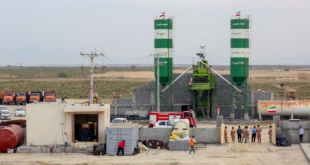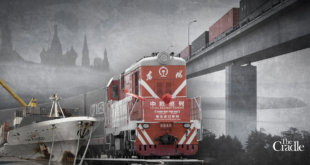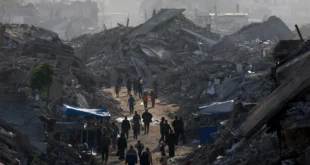Repeated reports alleging the growing desire of the West to push Ukraine into peace talks with Russia provide an opportunity to consider how such talks would actually play out (Nezavisimaya gazeta, November 24, 2022; Mk.ru, April 25).
The main question here is: What is the desired outcome of the war for Western negotiators? The United States, for example, “reaffirms its unwavering support for Ukraine’s sovereignty and territorial integrity within its internationally recognized borders, extending to its territorial waters” (State.gov, May 3). However, little clarity has been given on how future relations with Moscow would look.
Since the negotiations in question are not about Russia’s full and unconditional surrender, then, in order to strike a deal with Vladimir Putin, negotiators, both from Ukraine and the West (undoubtedly Western representatives would play an essential part here), would have to offer the Russian president something. It is utterly doubtful that Putin will show any goodwill and will not take his claws out of Ukrainian soil for free.
Putin will obviously only agree to negotiate if he is guaranteed new gains that will justify the war in the eyes of his elite and the Russian population. At minimum, these would include demands that Crimea and the newly annexed territories be recognized as Russian territory—and, quite possibly, obligations from Ukraine to be fully demilitarized and “denazified” (Kremlin.ru, February 24, 2022). With each round of negotiations, Russian diplomats will put increased pressure on the Ukrainian and Western representatives, threatening to derail the talks. And whoever initiates the talks will be blamed for insufficient efforts to achieve a peace.
That said, it is very much unclear why it is expected that Putin would abide by such agreements—especially if they serve no purpose for him. The Kremlin leader has repeatedly demonstrated that he is not a man of negotiations and compliance. He has consistently violated international law—the Charter of the United Nations, international humanitarian law, as well as arms control treaties and commitments—destroying the fragile system of international security and strategic stability and provoking a new arms race (Un.org, March 2, 2022; Pravo.gov.ru, February 28; Icc-cpi.int, March 17). That does nothing to strengthen his credibility.
It is no great discovery that Putin, like any other dictator, only understands the language of strength (Twitter/Mike_Pence, February 27, 2022; Senate.gov, February 16). In conflicts, the one who loses (i.e., the weak) asks for negotiations. The strong may agree to these negotiations but never offers them first. This is exactly how all the statements, reports or leaks about the willingness or even desire of Western countries to push Kyiv to negotiate with Russia are perceived in Moscow—as evidence of a split in the Western camp, the weakness of the West and its fatigue with the war. Repeatedly, Putin is convinced that he is doing everything right and must continue his chosen course. Eventually the West, despite its enormous superiority in strength and resources, will surrender because of its internal weakness (Meduza, February 24). As Russia’s first foreign minister Andrei Kozyrev wrote, “Democracies prefer short-term risk aversion to long-term self-preservation” (Twitter/andreivkozyrev, April 1).
Obviously, any peace on Putin’s terms is fraught with far-reaching geopolitical implications. Such an agreement, for example, would shatter Taiwan’s confidence in US and Western support vis-à-vis any military conflict with China, as the perception would arise that Washington will take the time to weigh whether an armed confrontation with a nuclear power is in its interests. As US Secretary of State Antony Blinken recently said, “We … don’t want to broaden this war and certainly don’t want to do anything to create a lot of conflagration” (State.gov, February 23).
Hopes that China will influence Putin and force him to negotiate peace seem rather naïve. It is hardly in Beijing’s interests to play on the same side as the West, realizing that, as soon as the “Russian issue” is closed, China will become a target for economic and political pressure from the US. Beijing can be expected to make declarative statements about the need for negotiations, which it does all the time, while, behind the scenes, the Chinese will continue to support Putin (Fmprc.gov.cn, February 24).
The idea that an end to the hostilities in Ukraine will reduce the threat to peace and security in Europe may seem quite attractive. This, alas, is not the case. The threat to peace is not simply Moscow’s war against Ukraine; it is the Putin regime itself. It has exhausted all capacities to ensure economic growth in Russia and is holding onto the repression of growing discontent by force (Vedomosti, October 8, 2019). The regime uses sophisticated propaganda to channel this discontent outward. The attack on Ukraine is not only a reflection of Putin’s pseudo-historical fantasies and delusions of grandeur but also the objective result of the entire development of the Russian power vertical over the past 20 years. If the problem is to be solved comprehensively, then it is the source that needs to be neutralized.
Support for Putin in Russia is based on a simple fact: both the Russian elite and society understand what may await them under the current regime but have no idea what will come once it is gone (DW, February 18). Fear of the unknown prompts the obvious choice: it “makes us rather bear those ills we have than fly to others that we know not of.” Letting these groups know that they can abandon the “dark side” and still have a future may prove far more frightening to Putin than more sanctions packages.
To facilitate this desired outcome, first, Western governments should declare that they will not by any means initiate any negotiations with Putin or his representatives unless officially requested by the latter. Second, and perhaps more consequential, the West must resolutely stick to this approach. Third, it would be important to emphasize that Western countries would gladly negotiate with any Russian government that succeeds Putin and that declares its willingness to end hostilities and negotiate a peaceful settlement. Such an approach, together with creating ways to remove those regime functionaries who would turn against the war from the sanctions list, could help split the ranks of Putin’s elite, given that the war against Ukraine is unpopular among the public (Istories.media, September 29, 2022).
Of course, this should be done against the backdrop of constant military support to the Ukrainian Armed Forces, which should be able to inflict a crushing defeat on the aggressor with such assistance. Only then can the prospect of negotiations from a position of strength take any real shape.
Some in the West seem to calm themselves by saying that this is, after all, a war between Russia and Ukraine, and they are merely helping the victim. However, for the rest of the world, the picture is quite the opposite. The Global South perceives it as a war between Russia and the West headed by the US. These developing countries are closely watching how the West accepts the challenge by Putin. It should be no surprise that far too many in these regions have no sympathy for the West. A great number of political elites are, undoubtedly, sincerely anticipating Western failure and humiliation (DW, March 1, 2022; Parliamnet.gov.za, March 17, 2022).
Ultimately, the West became a party to the war at the very moment its leaders decided to stand by Ukraine. This war does not presuppose a win-win outcome. It is a classic zero-sum game—if one wins, the other loses. Should it be Putin who wins?
 Eurasia Press & News
Eurasia Press & News




